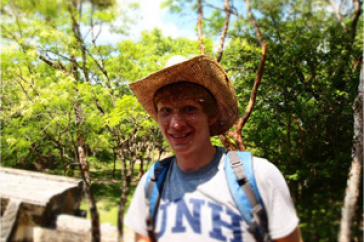UNH Anthropology Student Helps Discover Confederate Soldier's Homestead in Belize

Sophomore John DeGennaro in Belize on his first archaeological field research project. View the slideshow.
DURHAM, N.H. - A University of New Hampshire undergraduate student in Belize on his first archaeological field research trip has helped identify the homestead of a prominent U.S. Confederate soldier from Alabama who fled the country after the Civil War.
"It was really great learning how to be an archaeologist. I liked hunting for information by looking through archival records, and I enjoyed the field work, too. What I really enjoyed was being able to connect them - to work to find old documents to uncover who lived there and to excavate at the site for the material artifacts of those people," said John DeGennaro, a sophomore from Plymouth.
DeGennaro conducted his research under the guidance of Eleanor Harrison-Buck, assistant professor of archaeology, as part of UNH's Research Experience and Apprenticeship Program, a program designed for highly motivated, first-year honors students offered by the UNH Hamel Center for Undergraduate Research. The site he worked at is one of several sites in the middle Belize Valley where members of the Belize River East Archaeology (BREA) project, which is led by Harrison-Buck, have identified surface scatters of artifacts that initially were thought to be from the 18th century British Colonial period.
However, DeGennaro and senior BREA researcher Adam Kaeding confirmed that the scatters of British Colonial artifacts - ceramics, metals, bottle glass, and clay pipes - were, in fact, from a later period. When DeGennaro and Kaeding dated the artifacts and then reviewed survey maps and records from the dated period - the mid-19th century - they learned that the archaeological site was that of the homestead of Confederate soldier and businessman Colin J. McRae.
McRae was a former Confederate financial agent in Europe who fled to Belize, British Honduras, following the U.S. Civil War to avoid war crimes. There he purchased land at the confluence of Saturday Creek in the mid-section of the Belize River, and ran a plantation and mercantile business associated with the mahogany trade. Although criminal charges were ultimately dropped, McRae was never officially pardoned and he decided it was too risky to return to the former Confederate States. He lived in Belize until his death in 1877, according to the Colin J. McRae Collection at the South Carolina Confederate Relic Room and Military Museum. His brother, John J. McRae, is a former governor of Mississippi.
DeGennaro would like to continue working with Harrison-Buck and the BREA project. He hopes to return to the area to conduct additional archival and field research, with the goal of creating a more complete Colonial history of the area.
"John's research is making an important contribution to the BREA project," Harrison-Buck said. "Not much is known about this early period of Colonial history in Belize, and few sites have ever been identified or excavated archaeologically. We hope our work will shed greater light on the broader impact of the Colonial period and the profound changes it brought to indigenous groups in the Maya area and throughout the Americas, as well as other parts of the world."
In addition to conducting his own research, DeGennaro was one of three students who participated in UNH's archaeological field school in Belize this summer. Based near the capital city of Belmopan, this intensive four-week program allows students to investigate ancient Maya archaeological sites in the jungles of the eastern Belize River valley. Students can experience hands-on training in surveying and mapping of archaeological sites, as well as excavation and artifact processing. They also attend lectures and labs, and have the opportunity to tour several other sites on the weekends.
DeGennaro said that without the generosity of UNH donors, he would not have been able to go to Belize to conduct his research. His trip was funded through scholarships and fellowships from The Hamel Center for Undergraduate Research, the Trout Scholarship, and the Rebecca Lang Memorial Fund.
"It was really amazing that I had this opportunity in the first place. When I heard about the field school, I knew that it would be difficult for me to go because I don't have a lot of money to spend on these sorts of opportunities," DeGennaro said. "Due to multiple funding sources, I was able to do it, and it was an amazing experience."
The Hamel Center for Undergraduate Research was established through the generosity of Dana A. and his late wife Kathryn Poore Hamel, long-time friends and benefactors of UNH. The Trout Scholarship provides financial assistance to students who plan to participate in a College of Liberal Arts UNH-managed study abroad. This award was established in honor of Prof. Thomas Trout, an avid international traveler who was a passionate proponent of the undergraduate study abroad experience. The Rebecca Lang Memorial Fund was set up to support undergraduate anthropology and archaeology field research by Kathleen and Robert Lang of Canterbury, the parents of Rebecca Lang. A UNH anthropology graduate who did extensive field work as an undergraduate in Belize and Guatemala, Lang was offered a full scholarship at the University of California at Riverside and was on her way to graduate school when she was killed in a car accident on Sept. 20, 2005.
The University of New Hampshire, founded in 1866, is a world-class public research university with the feel of a New England liberal arts college. A land, sea, and space-grant university, UNH is the state's flagship public institution, enrolling 12,200 undergraduate and 2,300 graduate students.
SLIDESHOW OF STUDENT'S BELIZE EXPERIENCE
http://unh.edu/ucm/slideshows/belize/
-30-
Latest News
-
January 12, 2026
-
December 4, 2025
-
November 26, 2025
-
November 6, 2025
-
November 5, 2025













































